-
International Traveling and Foreign Electricity – How to Ensure You Can Plug In
Traveling outside our own country for work, especially as part of an event, tour, or festival, while very exciting, can also present some unique challenges when it comes to being able to use our own electrical gear. Since countries can vary in their voltage, frequency, and outlet type, it’s important that you come prepared with the proper adapters to ensure you’ll get everything working without fear of frying your gear.
The world runs of two sets of voltages – 110/125 V (e.g., North America) or 220/240 V (e.g, UK, Australia, New Zealand, Europe). In some cases, you’ll also need a voltage converter or transformer as well as an outlet adapter. The label on your electrical device will inform you if it’s a single voltage (cannot accommodate the other voltage level – this would require a transformer), dual voltage (can use 120 V or 240 V and does not require a transformer), or multi-voltage (able to use a range of voltages, like 100 V – 240 V – these also don’t require a transformer).
A note about single voltage devices – electrical devices (such as mechanical motors) can use a transformer or a converter. Electronic devices (such as electronic motors with chips or circuits) require a transformer. Many converters operate as both a converter and a transformer. Read more about these at REI’s informative website.
A note about voltage variances by country – if you are traveling to multiple countries in one continent, that doesn’t necessarily mean that the voltages and outlets will be similar. Further, countries may change how they handle power at any time, so it’s always best to check multiple resources for the latest information, especially if you are planning to move there for work. ElectricalOutlet.org is a fantastic resource that breaks down what’s available power-wise by country.
Currently, there are 15 types of outlet styles in use worldwide (photos below courtesy of World Standards), each given a letter by the US Department of Commerce International Trade Association: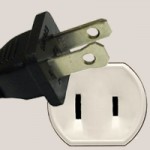 Type A – USA, Canada Mexico & Japan
Type A – USA, Canada Mexico & Japan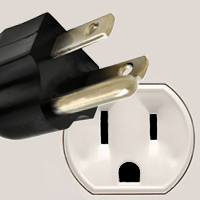 Type B – USA, Canada, Mexico, & Japan
Type B – USA, Canada, Mexico, & Japan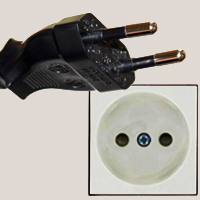 Type C – Europe, South America, & Asia
Type C – Europe, South America, & Asia Type D – India
Type D – India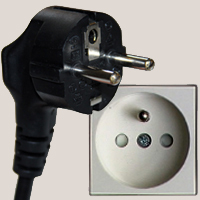 Type E – France, Belgium, Poland, Slovakia, Czech Republic
Type E – France, Belgium, Poland, Slovakia, Czech Republic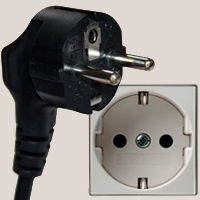 Type F – Europe & Russia except the UK and Ireland
Type F – Europe & Russia except the UK and Ireland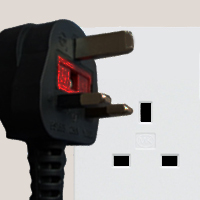 Type G – UK, Ireland, Malta, Malaysia, Singapore
Type G – UK, Ireland, Malta, Malaysia, Singapore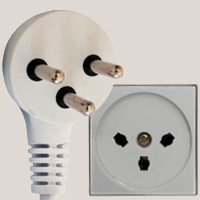 Type H – Israel, West Bank, Gaza Strip
Type H – Israel, West Bank, Gaza Strip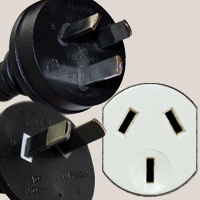 Type I – Australia, New Zealand, China, Argentina
Type I – Australia, New Zealand, China, Argentina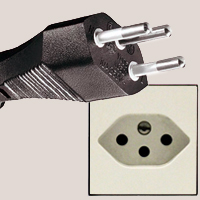 Type J – Switzerland Leichtenstein, Rwanda
Type J – Switzerland Leichtenstein, Rwanda Type K – Denmark, Greenland
Type K – Denmark, Greenland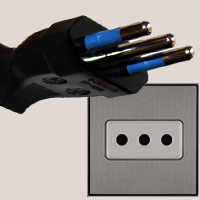 Type L – Italy, Chile
Type L – Italy, Chile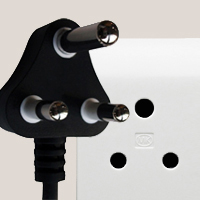 Type M – South Africa
Type M – South Africa Type N – Brazil
Type N – Brazil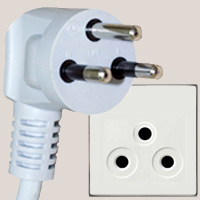 Type O – Thailand
Type O – Thailand
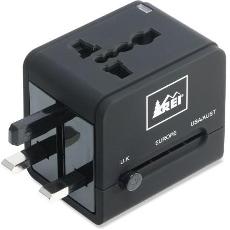 In order to ensure you’ve got the proper adapter, you’ll want to match it to the country or countries you’re going to visit. Some adapters, like the one shown here, can accommodate virtually all types (this one covers A, B, C, E, F, G, H, I, J, K, L) eliminating the need for you to buy multiple adapters. You can find out more details or purchase it here.
In order to ensure you’ve got the proper adapter, you’ll want to match it to the country or countries you’re going to visit. Some adapters, like the one shown here, can accommodate virtually all types (this one covers A, B, C, E, F, G, H, I, J, K, L) eliminating the need for you to buy multiple adapters. You can find out more details or purchase it here.
If you’re bringing in high powered electric single voltage devices, here’s a 500 watt transformer
that could work well.
For single voltage devices that don’t require a transformer, this 200 watt power converter
with USB inputs may handle your needs.
Want to read more about electricity?
- Electricity Guide
- Demystifying Electrical Generators and Decibel Levels
- How to Buy a Voltage Converter or Voltage Transformer








